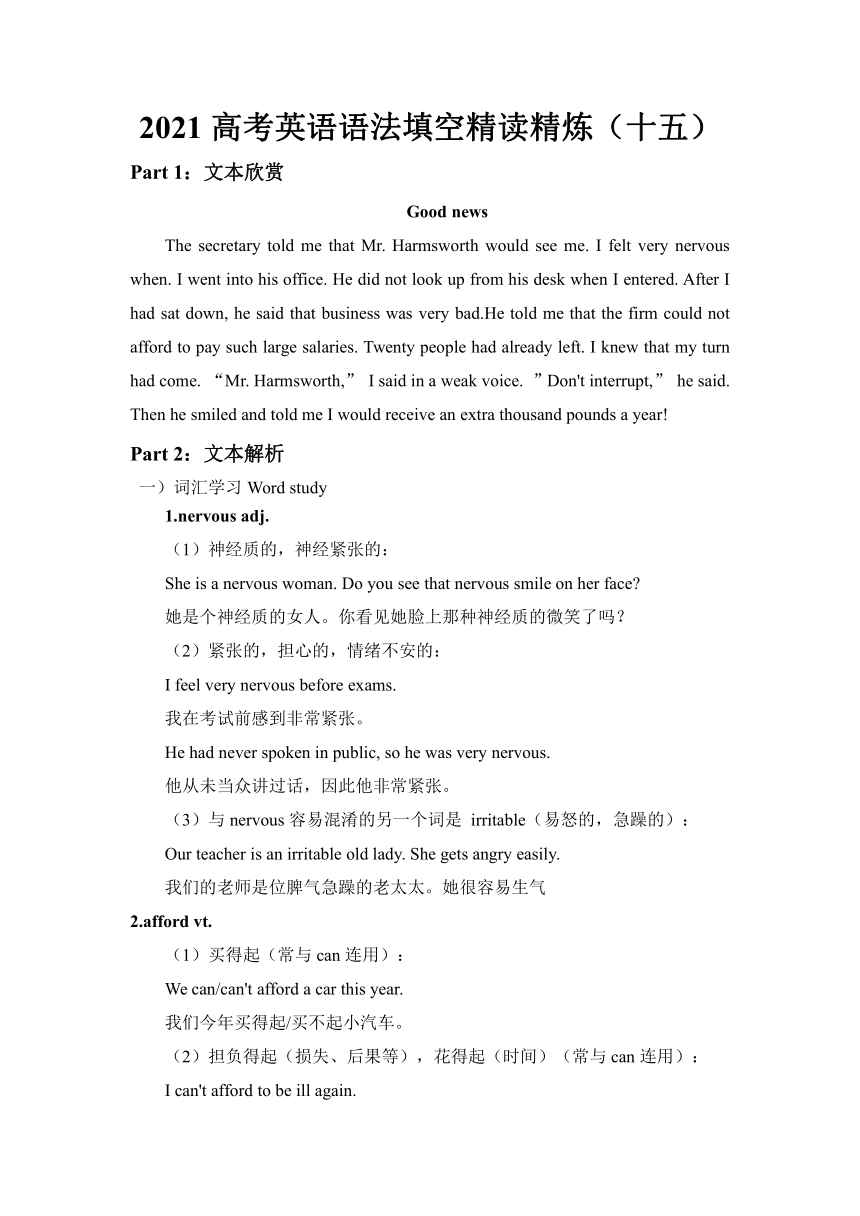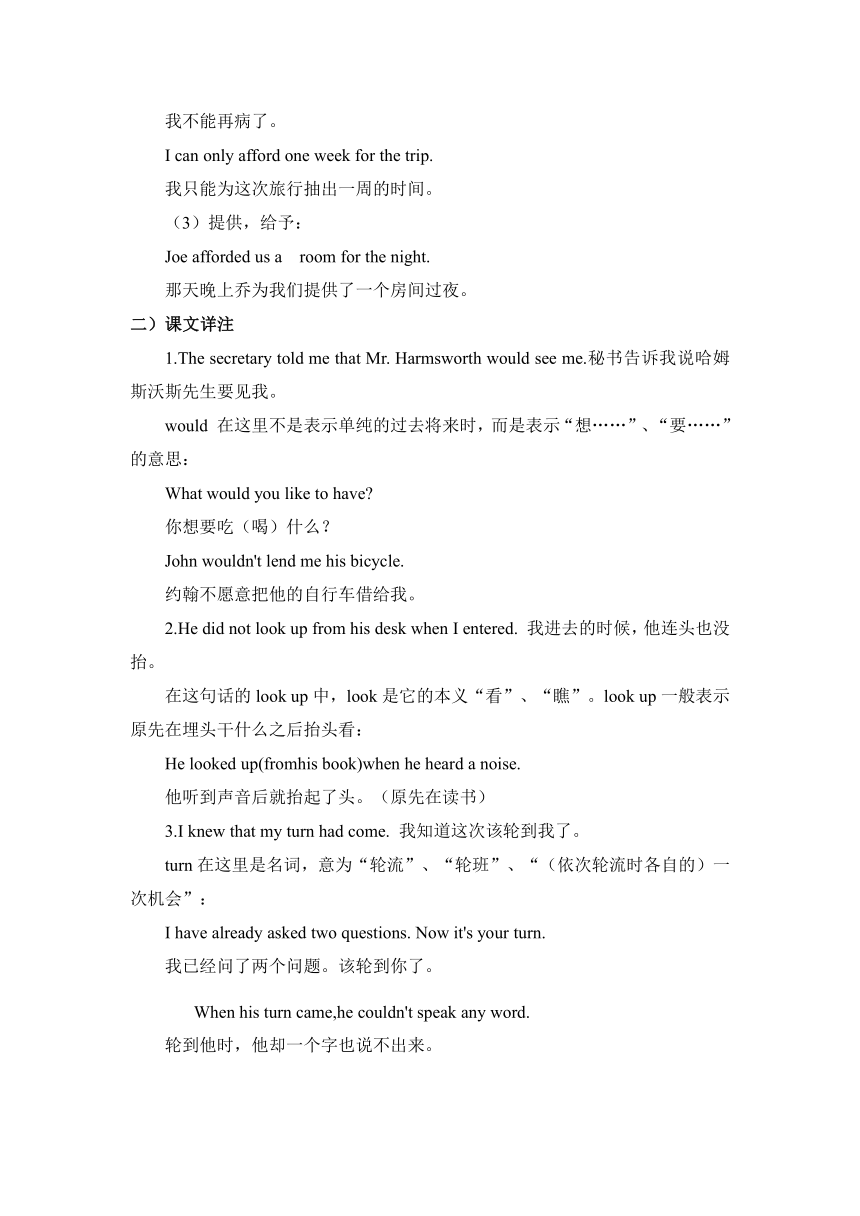2021届高考二轮复习英语语法填空精读精炼学案(十五) Word版含答案
文档属性
| 名称 | 2021届高考二轮复习英语语法填空精读精炼学案(十五) Word版含答案 |  | |
| 格式 | doc | ||
| 文件大小 | 21.0KB | ||
| 资源类型 | 教案 | ||
| 版本资源 | 通用版 | ||
| 科目 | 英语 | ||
| 更新时间 | 2021-01-23 19:15:22 | ||
图片预览


文档简介
2021高考英语语法填空精读精炼(十五)
Part 1:文本欣赏
Good news
The secretary told me that Mr. Harmsworth would see me. I felt very nervous when. I went into his office. He did not look up from his desk when I entered. After I had sat down, he said that business was very bad.He told me that the firm could not afford to pay such large salaries. Twenty people had already left. I knew that my turn had come. “Mr. Harmsworth,” I said in a weak voice. ”Don't interrupt,” he said. Then he smiled and told me I would receive an extra thousand pounds a year!
Part 2:文本解析
一)词汇学习Word study
1.nervous adj.
(1)神经质的,神经紧张的:
She is a nervous woman. Do you see that nervous smile on her face?
她是个神经质的女人。你看见她脸上那种神经质的微笑了吗?
(2)紧张的,担心的,情绪不安的:
I feel very nervous before exams.
我在考试前感到非常紧张。
He had never spoken in public, so he was very nervous.
他从未当众讲过话,因此他非常紧张。
(3)与nervous容易混淆的另一个词是 irritable(易怒的,急躁的):
Our teacher is an irritable old lady. She gets angry easily.
我们的老师是位脾气急躁的老太太。她很容易生气
2.afford vt.
(1)买得起(常与can连用):
We can/can't afford a car this year.
我们今年买得起/买不起小汽车。
(2)担负得起(损失、后果等),花得起(时间)(常与can连用):
I can't afford to be ill again.
我不能再病了。
I can only afford one week for the trip.
我只能为这次旅行抽出一周的时间。
(3)提供,给予:
Joe afforded us a room for the night.
那天晚上乔为我们提供了一个房间过夜。
二)课文详注
1.The secretary told me that Mr. Harmsworth would see me.秘书告诉我说哈姆斯沃斯先生要见我。
would 在这里不是表示单纯的过去将来时,而是表示“想……”、“要……”的意思:
What would you like to have?
你想要吃(喝)什么?
John wouldn't lend me his bicycle.
约翰不愿意把他的自行车借给我。
2.He did not look up from his desk when I entered. 我进去的时候,他连头也没抬。
在这句话的look up中,look是它的本义“看”、“瞧”。look up一般表示原先在埋头干什么之后抬头看:
He looked up(fromhis book)when he heard a noise.
他听到声音后就抬起了头。(原先在读书)
3.I knew that my turn had come. 我知道这次该轮到我了。
turn在这里是名词,意为“轮流”、“轮班”、“(依次轮流时各自的)一次机会”:
I have already asked two questions. Now it's your turn.
我已经问了两个问题。该轮到你了。
When his turn came,he couldn't speak any word.
轮到他时,他却一个字也说不出来。
4."Mr. Harmsworth,"I said in a weak voice.“哈姆斯沃斯先生,”我无力地说。
weak在这里不是指身体虚弱,而是指声音“微弱”、“无力”,因为怕被开除而感到紧张。
5.Then he smiled and told me I would receive an extra thousand pounds a year!
然后他微笑了一下告诉我说,我每年将得到1,000英镑的额外收入。
(1)extra 表示“额外的”、“外加的”、“份外的”:
On Sundays, I usually get some extra sleep.
星期天我通常要多睡一会儿。
Last month, he was paid an extra hundred pounds.
他上个月多得了100英镑。
(2)a在这里可译为“每一”:
I went to London once a month.
我每月去一次伦敦。
Jack telephoned Pauline four times a day.
杰克每天给波琳打4次电话。
三)语法
间接引语(Indirect speech)
把某人所说的话告诉另外一个人时,应该使用间接引语(有的语法书称之为“转述引语”)。引述动词(如say,tell)可能是现在时,也可能是过去时(最常用)。
间接陈述句的时态往往受引述动词的影响。引述陈述句时最常用的动词是say和tell。它们之间的区别是tell后面必须跟表示人称的间接宾语(tell sb….),而say后面则可跟或不跟to +讲话对象。
如果需要提到听话者,tell +间接宾语通常比say + to +sb. 更常用。在say和tell后面一般不可加逗号。如果间接引语中的引述动词是现在时,那么其后的时态通常与原来口头陈述句的时态相同。转述刚刚说完的话时通常如此;引述动词如果是过去时,那么间接引语中的时态通常要“往回移”(即“倒移”)。
一条普遍的规则是“现在时变为过去时,过去时变为过去完成时”。直接引语。
Part 3:文本翻译
佳音
秘书告诉我说哈姆斯沃斯先生要见我。我走进他的办公室,感到非常紧张。我进去的时候,他连头也没抬。待我坐下后,他说生意非常不景气。他还告诉我,公司支付不起这么庞大的工资开支,有20个人已经离去。我知道这次该轮到我了。
“哈姆斯沃斯先生,”我无力地说。
“不要打断我的话,”他说。
然后他微笑了一下告诉我说,我每年将得到1,000 英镑的额外收入。
Part 4:语法填空
What was the good news?
The secretary told me that Mr. Harms worth would see me. I felt very 1 (nerve) when I went into his office. He didn’t look 2 from his desk when I 3 (enter). After I 4 (sit)down, he said that business was very bad. He told me that the firm could not afford 5 (pay) such large salaries.Twenty people had already 6 (leave). I knew that 7 turn had come.
“Mr.Harms worth,” I said 8 a weak voice.
”Don’t interrupt,” he said.
The he smiled and told 9 that I would receive 10 extra thousand pounds a year!
参考答案
1. nervous
2. up
3. entered
4. had sat
5. to pay
6. left
7. my
8. in
9. me
10. an
Part 1:文本欣赏
Good news
The secretary told me that Mr. Harmsworth would see me. I felt very nervous when. I went into his office. He did not look up from his desk when I entered. After I had sat down, he said that business was very bad.He told me that the firm could not afford to pay such large salaries. Twenty people had already left. I knew that my turn had come. “Mr. Harmsworth,” I said in a weak voice. ”Don't interrupt,” he said. Then he smiled and told me I would receive an extra thousand pounds a year!
Part 2:文本解析
一)词汇学习Word study
1.nervous adj.
(1)神经质的,神经紧张的:
She is a nervous woman. Do you see that nervous smile on her face?
她是个神经质的女人。你看见她脸上那种神经质的微笑了吗?
(2)紧张的,担心的,情绪不安的:
I feel very nervous before exams.
我在考试前感到非常紧张。
He had never spoken in public, so he was very nervous.
他从未当众讲过话,因此他非常紧张。
(3)与nervous容易混淆的另一个词是 irritable(易怒的,急躁的):
Our teacher is an irritable old lady. She gets angry easily.
我们的老师是位脾气急躁的老太太。她很容易生气
2.afford vt.
(1)买得起(常与can连用):
We can/can't afford a car this year.
我们今年买得起/买不起小汽车。
(2)担负得起(损失、后果等),花得起(时间)(常与can连用):
I can't afford to be ill again.
我不能再病了。
I can only afford one week for the trip.
我只能为这次旅行抽出一周的时间。
(3)提供,给予:
Joe afforded us a room for the night.
那天晚上乔为我们提供了一个房间过夜。
二)课文详注
1.The secretary told me that Mr. Harmsworth would see me.秘书告诉我说哈姆斯沃斯先生要见我。
would 在这里不是表示单纯的过去将来时,而是表示“想……”、“要……”的意思:
What would you like to have?
你想要吃(喝)什么?
John wouldn't lend me his bicycle.
约翰不愿意把他的自行车借给我。
2.He did not look up from his desk when I entered. 我进去的时候,他连头也没抬。
在这句话的look up中,look是它的本义“看”、“瞧”。look up一般表示原先在埋头干什么之后抬头看:
He looked up(fromhis book)when he heard a noise.
他听到声音后就抬起了头。(原先在读书)
3.I knew that my turn had come. 我知道这次该轮到我了。
turn在这里是名词,意为“轮流”、“轮班”、“(依次轮流时各自的)一次机会”:
I have already asked two questions. Now it's your turn.
我已经问了两个问题。该轮到你了。
When his turn came,he couldn't speak any word.
轮到他时,他却一个字也说不出来。
4."Mr. Harmsworth,"I said in a weak voice.“哈姆斯沃斯先生,”我无力地说。
weak在这里不是指身体虚弱,而是指声音“微弱”、“无力”,因为怕被开除而感到紧张。
5.Then he smiled and told me I would receive an extra thousand pounds a year!
然后他微笑了一下告诉我说,我每年将得到1,000英镑的额外收入。
(1)extra 表示“额外的”、“外加的”、“份外的”:
On Sundays, I usually get some extra sleep.
星期天我通常要多睡一会儿。
Last month, he was paid an extra hundred pounds.
他上个月多得了100英镑。
(2)a在这里可译为“每一”:
I went to London once a month.
我每月去一次伦敦。
Jack telephoned Pauline four times a day.
杰克每天给波琳打4次电话。
三)语法
间接引语(Indirect speech)
把某人所说的话告诉另外一个人时,应该使用间接引语(有的语法书称之为“转述引语”)。引述动词(如say,tell)可能是现在时,也可能是过去时(最常用)。
间接陈述句的时态往往受引述动词的影响。引述陈述句时最常用的动词是say和tell。它们之间的区别是tell后面必须跟表示人称的间接宾语(tell sb….),而say后面则可跟或不跟to +讲话对象。
如果需要提到听话者,tell +间接宾语通常比say + to +sb. 更常用。在say和tell后面一般不可加逗号。如果间接引语中的引述动词是现在时,那么其后的时态通常与原来口头陈述句的时态相同。转述刚刚说完的话时通常如此;引述动词如果是过去时,那么间接引语中的时态通常要“往回移”(即“倒移”)。
一条普遍的规则是“现在时变为过去时,过去时变为过去完成时”。直接引语。
Part 3:文本翻译
佳音
秘书告诉我说哈姆斯沃斯先生要见我。我走进他的办公室,感到非常紧张。我进去的时候,他连头也没抬。待我坐下后,他说生意非常不景气。他还告诉我,公司支付不起这么庞大的工资开支,有20个人已经离去。我知道这次该轮到我了。
“哈姆斯沃斯先生,”我无力地说。
“不要打断我的话,”他说。
然后他微笑了一下告诉我说,我每年将得到1,000 英镑的额外收入。
Part 4:语法填空
What was the good news?
The secretary told me that Mr. Harms worth would see me. I felt very 1 (nerve) when I went into his office. He didn’t look 2 from his desk when I 3 (enter). After I 4 (sit)down, he said that business was very bad. He told me that the firm could not afford 5 (pay) such large salaries.Twenty people had already 6 (leave). I knew that 7 turn had come.
“Mr.Harms worth,” I said 8 a weak voice.
”Don’t interrupt,” he said.
The he smiled and told 9 that I would receive 10 extra thousand pounds a year!
参考答案
1. nervous
2. up
3. entered
4. had sat
5. to pay
6. left
7. my
8. in
9. me
10. an
